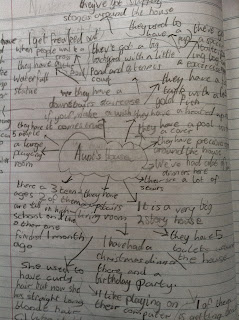Posts
Showing posts from May, 2011
Encouraging Deeper Writing Conversations With Students
- Get link
- X
- Other Apps

When students begin talking about their writing, they usually want to tell you what it is about, not how it is written. Sharing subject matter is important, but we want to encourage students to talk about their writing in more sophisticated ways. Over time student writers can be encouraged to talk about their purpose as writers, their audience for each piece of writing, and the techniques they use as writers in order to reach their audience. We also need to teach children to have similar conversations with each other about their respective writing pieces. In order to encourage this sort of “writing workshop conversation,” you can set up specific paired sharing times for students to share their writing in the way you have modeled in conferences. You can pose specific questions or tasks for the sharing sessions, such as: ‘I want you to talk with your partner about why you are writing your story—what feelings do you want the reader to feel?’ or ‘Try to find as ...
Reading-Writing Connections – How We Strengthen the Links
- Get link
- X
- Other Apps

‘Nobody but a reader ever became a writer.’ Richard Peck To strengthen those essential reading- writing connections for students I frequently share books I am currently reading with the various classes I visit. They may include books I am currently reading, or books I have recently purchased and intend to read next. I give them a ‘tasting’ of the book; explaining why I chose that particular book, what its mainly about and some of the things I’ve discovered or hope to discover during my reading. Recently I shared the following books: A Family of Readers by Roger Sutton and Martha Parravano -a book lover’s guide to sharing children and young adult literature. Land’s Edge by Tim Winton – A coastal memoir of rich childhood memories Write Starts by Hal Zine Bennett – wisdom and encouragement in the process of writing Hurricane by David Wiesner – a picture story book that tells the story of a hurricane’s progress It’s A Book by Lane Smith –a picture story book that celebrates...
The Way Forward With Brainstorming
- Get link
- X
- Other Apps

Student's comprehensive brainstorming sample This post is appearing similtaneously on The Two Writing Teachers blog site where I am honoured to be this week's guest blogger. I hope you enjoy reading about brainstorming. I also hope you find strategies here that you can readily apply to your own writing workshops. Brainstorming is a strategy that has many learning applications. In this post, as guest blogger, I want to specifically look at brainstorming within the context of writing workshop and how we can assist developing writers to use it more effectively. It would be inaccurate to think of pre-writing as merely brainstorming. From my observations many teachers do, unfortunately. This is not to say that brainstorming is not a critical pre writing skill for young writers to acquire. In fact, it provides an excellent way to deepen student thinking around a new to...
Linda Darling Hammond discusses the dangers of 'narrow' national testing
- Get link
- X
- Other Apps

NAPLAN has been spreading across the Australian educational landscape with alarming speed. It has begun to devour valuable teaching time in many schools as pressured educators fall under its hideous spell and indulge in highly questionable 'test prep' practices. Practices that do a disservice to what we know about effective teaching. With that in mind, I happened to read this article in the Melbourne Age... Professor Linda Darling Hammond has been visiting Australia and has spoken regarding the inherent dangers of high stakes testing and the effects such assessments can have on curriculum. I thought her words of wisdom and warning were well worth sharing. US education expert blasts 'narrow' national testing Anna Patty The Age, Newspaper May 2, 2011 NAPLAN-style testing and reporting have failed in the United States by narrowing the curriculum and corru...
Timed Writing Experience Prior to NAPLAN
- Get link
- X
- Other Apps

Next week Australian students in the grades 3,5,7 and 9 undertake NAPLAN (National Assessment Program in Literacy and Numeracy). Before that time their is a need to examine the test writing genre and how it differs from writing as we know it. By conducting this close analysis of the differences in approach we allow students to more clearly see the artificiality of the test writing. It would be helpful to chart these differences, particularly for Grade three students who are having their first experience with the demands of writing to the clock on a given topic (prompt). A Grade three student told me last week that we should not call it a ‘writing test. Instead we should call it a ‘writing challenge’ I liked his attitude and so we began talking about the challenges this type of writing threw our way. We need to look at providing opportunities for students to experience timed writing’ as part of building further stamina for the task. I see the task in thr...